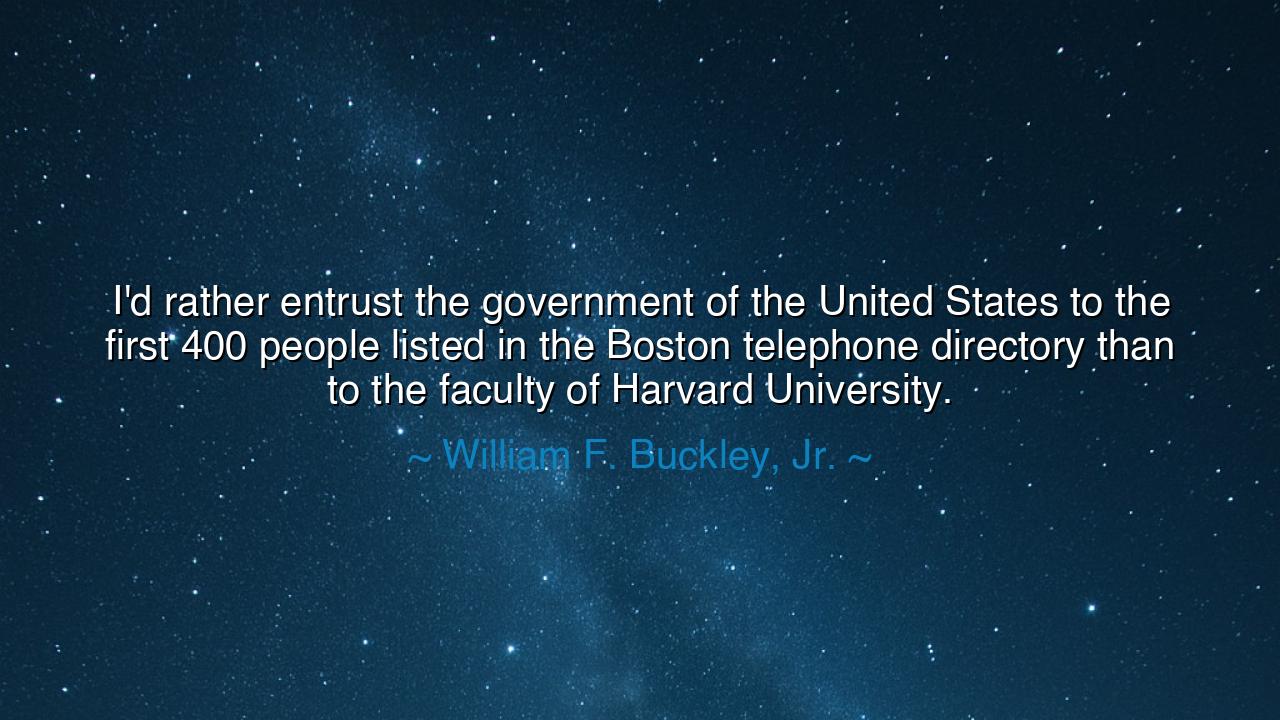
I'd rather entrust the government of the United States to the
I'd rather entrust the government of the United States to the first 400 people listed in the Boston telephone directory than to the faculty of Harvard University.






In the bold and unyielding voice of William F. Buckley, Jr., a champion of intellect bound to common sense, there rings a declaration that defied the pride of the powerful and the vanity of the learned: “I’d rather entrust the government of the United States to the first 400 people listed in the Boston telephone directory than to the faculty of Harvard University.” At first glance, it seems a jest — a clever barb from a man famed for his wit. Yet beneath the laughter lies a profound truth about wisdom, elitism, and the enduring faith in the common people. Buckley, ever the defender of ordered liberty, was not scorning knowledge itself, but the arrogance that too often grows from it — the false belief that intellect alone can govern the human heart or understand the needs of a nation.
The origin of this quote lies in the tension of mid-twentieth-century America, when Buckley, founder of National Review, sought to rekindle the spirit of conservative thought in a world drifting toward technocracy and abstraction. He had been educated at Yale and had lived among the elite, yet he saw how easily those surrounded by theory lost sight of the tangible realities of life. The faculty of Harvard, to him, symbolized not learning itself, but the detachment of those who believe their education grants them superiority over the governed. Against this, Buckley raised a timeless counterpoint: that virtue, experience, and common sense—though found in ordinary people—often form a firmer foundation for freedom than intellect unanchored by humility.
His words remind us that the government of a free people must rest not in the hands of a few self-proclaimed visionaries, but upon the character and judgment of the many. The 400 citizens in the telephone directory, though not scholars of philosophy or economics, represent a cross-section of humanity: workers, mothers, craftsmen, merchants — men and women who live by the fruits of their labor, who understand the value of honesty, and who bear directly the consequences of government’s success or failure. Buckley believed that such people, grounded in the realities of life, would govern with restraint and practical wisdom — not from ideology, but from responsibility. In their simplicity, he saw truth; in their humility, he saw strength.
History itself bears witness to his insight. When the American Republic was born, it was not built by philosophers in ivory towers, but by farmers, blacksmiths, and merchants guided by principle and courage. The Founding Fathers, though educated, trusted the capacity of the people to rule themselves through representation, not through rule by a class of intellectuals. They feared a government of “experts” — for when knowledge becomes detached from morality, it becomes tyranny in the name of reason. Indeed, history’s great tragedies often began with elites convinced that their intelligence alone gave them the right to decide the fate of nations. The fall of the French monarchy, the rise of totalitarian ideologies — each was born from minds that claimed enlightenment but forgot empathy.
Buckley’s quote, though steeped in humor, carries a warning both sharp and compassionate: never mistake intelligence for wisdom, or education for virtue. A society that worships expertise alone risks surrendering its freedom to those who value theory over humanity. The scholar may know the laws of economics, but the shopkeeper understands the cost of bread. The professor may write of justice, but the farmer knows the meaning of fairness. Buckley’s trust in ordinary citizens was not naïve; it was rooted in faith that freedom thrives when responsibility is shared, when every individual — not merely the credentialed few — bears the burden and blessing of self-government.
And yet, his message is not to despise learning or the learned. Knowledge, in its purest form, is a gift; but it must be tempered by humility and guided by conscience. The true scholar, like the true statesman, serves, rather than rules. The moment education becomes a badge of superiority rather than a tool for service, it loses its nobility. Thus, Buckley’s wisdom stands not against Harvard, but against hubris — against any system that forgets the dignity of the common man.
The lesson, then, is this: trust not in brilliance alone, but in character; not in titles, but in truth. A free society endures when wisdom flows upward from its people, not downward from its elites. To the learned, let Buckley’s words be a reminder — that intellect without empathy is barren, and governance without humility is doomed. And to the citizen, let it be an encouragement — that your voice, your labor, and your conscience are the true pillars of the Republic.
So, my child of the nation, remember this: greatness is not measured by diplomas or degrees, but by devotion to the common good. Honor the scholar who serves, and the worker who thinks. For when the people themselves embody both learning and virtue, when intellect joins hands with humility, then the republic shall stand unshaken — a testament not to the wisdom of the few, but to the faith and strength of the many.






AAdministratorAdministrator
Welcome, honored guests. Please leave a comment, we will respond soon